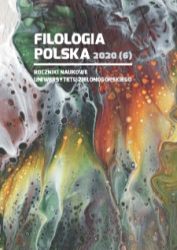Reactivation of dystopia in the latest popular literature. On the sidelines of reading the novels by Margaret Atwood and Ignacy Karpowicz
Keywords
Abstract
Dystopia seems to be one of the most popular motifs in the latest pop culture. One of the reasons for it is that political, economic, and social transformations have happened in many countries. Looming crises in many countries prove the populist politicians take over to start a revolution to change people’s lives and make their nations powerful again. Their point of view seems to be very radical and dangerous. Rapid change from multicultural society into patriarchal society shows that many people are marginalised. Atwood’s and Karpowicz’s novels show countries after transformation where violence and terror is a major rule to control citizens’ lives. Regime breaks the significant laws, and as a result of it, many minorities are discriminated. Their existence is worthless for many reasons. What is more, rebellious citizens are eliminated from society. Both novels reveal dangers that once imposed upon the society by the ultranationalist governments may lead to yet another war.
References
LITERATURA CYTOWANA
Literatura podmiotu
Atwood M., Opowieść podręcznej, przeł. Z. Uhrynowska-Hanasz, Warszawa 2017.
[Google Scholar]
Karpowicz I., Prawda, [w:] I. Karpowicz, Miłość, Kraków 2017.
[Google Scholar]
Literatura przedmiotu
Bernacki M., Antyutopia (utopia negatywna, dystopia), [w:] M. Bernacki, M. Pawlus, Słownik gatunków literackich, Bielsko-Biała 2004.
[Google Scholar]
Bilczewski T., Nowa komparatystyka. Lektura i komunikacja, [w:] Polonistyka bez granic, t. I: Wiedza o literaturze i kulturze, red. R. Nycz, W. Miodunka, T. Kunz, Kraków 2010.
[Google Scholar]
Ciarcińska K., „Opowieść podręcznej” Margaret Atwood. Antyutopia czy realna recepta na piekło kobiet?, [w:] Utopie, antyutopie, dystopie, red. I. Barwicka-Tylek, P. Eckhardt, M. Guzy, Kraków 2017.
[Google Scholar]
Czapliński P., Ironia i absolut, [7591-ironia-i-absolut.html] (dostęp: 12.04.2020).
[Google Scholar]
Engelking W., Margaret Atwood kontra #metoo, „Newsweek” 2020, nr 9.
[Google Scholar]
Gajek M., Cyfrowe pole bitwy, „Newsweek. Tajemnice Przyszłości” 2019, nr 1.
[Google Scholar]
Głażewski M., Dystopia albo ontologia Zło-bytu, „Przegląd Pedagogiczny” 2010, nr 1.
[Google Scholar]
Głowiński M., Zła mowa. Jak nie dać się propagandzie, Warszawa 2016.
[Google Scholar]
Gwozdowska A., Antyaborcyjna krucjata Trumpa, „Wprost” 2019, nr 23.
[Google Scholar]
Harrari Y.N., 21 lekcji na XXI wiek, przeł. M. Romanek, Kraków 2018.
[Google Scholar]
Kim R., Kto siał wiatr, „Newsweek” 2019, nr 31.
[Google Scholar]
Kyzioł A., Nie tylko ofiary, „Polityka” 2020, nr 8.
[Google Scholar]
Michalski C., Opowieść podręcznej po polsku, „Krytyka Polityczna”, 18.12.2013, [opowiesc-podrecznej-po-polsku].
[Google Scholar]
Milewski P., Krew na rękach prezydenta, „Newsweek” 2019, nr 33.
[Google Scholar]
Nogaś M., Faszyzm znowu tu jest, „Książki. Magazyn do Czytania” 2018, nr 2.
[Google Scholar]
Oramus D., O pomieszaniu gatunków. Science fiction a postmodernizm, Warszawa 2010.
[Google Scholar]
Pawlicka A., Kogo Polacy nie lubią najbardziej?, „Newsweek” 2019, nr 12.
[Google Scholar]
Pułka L., Antyutopia, [w:] Słownik literatury popularnej, red. T. Żabski, Wrocław 2006.
[Google Scholar]
Remak H., Literatura porównawcza – jej definicje i funkcja, [w:] Antologia zagranicznej komparatystyki literackiej, red. H. Janaszek-Ivaničkova, Warszawa 1997.
[Google Scholar]
Riemen R., Wieczny powrót faszyzmu, przeł. A. Oczko, Kraków 2014.
[Google Scholar]
Sargent L.T., The Three Faces of Utopianism. Revisited, „Utopian Studies” 1994, nr 5.
[Google Scholar]
Siedlecka E., Naklejka z ideologią, „Polityka” 2019, nr 31.
[Google Scholar]
Smuszkiewicz A., Dystopia, [w:] A. Niewiadomski, A. Smuszkiewicz, Leksykon polskiej literatury fantastycznej, Poznań 1990.
[Google Scholar]
Szacki J., Spotkania z utopią, Warszawa 2000.
[Google Scholar]
Tokarska-Bakir J., Nierozgarnięci, „Książki. Magazyn do Czytania” 2011, nr 1.
[Google Scholar]
Wanat E., Białystok – polskie Stonewall, „Wprost” 2019, nr 31.
[Google Scholar]
Wichowicz A., Her-story. Opowieść podręcznej, [her-story-opowiesc-podrecznej].
[Google Scholar]
Wilk E., Bluzg, „Polityka” 2019, nr 31.
[Google Scholar]
Wójcik Ł., Rok nie prorok, „Polityka” 2019, nr 23.
[Google Scholar]
Zając A., Pismo, ciało, afekt. O „Miłości” Ignacego Karpowicza, [pismo-cialo-afekt-o-milosci-ignacego-karpowicza] [Google Scholar]
[7,127763,23041463,zatrzymana-rewolucja-czy-akcja-metoo-faktycznie-poszla-za.html]
[bkhdf31]
Preview
Downloads
Published
How to Cite
Issue
Section
Categories
Copyright & License

This work is licensed under a Creative Commons Attribution-NonCommercial-NoDerivatives 4.0 International License.
Copyrights (a). In principle, authors who are not employed by the University of Zielona Góra retain the copyright, including publishing rights to the articles, without restrictions.
Copyrights (b). In principle, authors who are employed by the University of Zielona Góra, do not retain the copyright, including publishing rights to the articles. In such cases the copyright holder is the University of Zielona Góra.







































